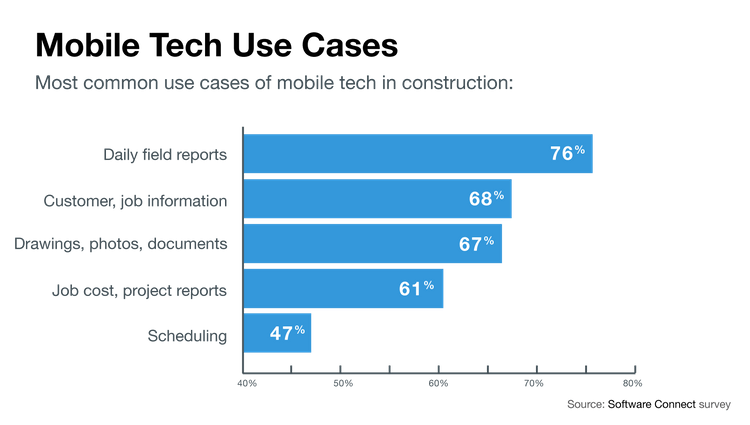The Best Construction Apps
Get the best software for your business. Compare product reviews, pricing below.
What Are Construction Apps?
A construction app is a type of construction management software that provides either a single module or a collection of fully-integrated capabilities to contractors in the field. These mobile applications are accessed by construction companies on Android and iOS smartphones and can usually be downloaded from either the Apple or Google Play app stores. Because many construction workers and contractors do their work in the field, a construction app can give them real-time capabilities to improve their job performance.
Many construction apps are developed with mobile users in mind, as opposed to using a mobile-version of desktop software that may allow you to view information from a mobile browser. Because of this, they tend to take advantage of smartphone features that you can’t always access from an office computer. This includes a camera for taking pictures, messaging for team communication, push notifications for project status alerts, GPS tracking for checking in and out from job sites, leveling tools for accurate measurements, and more.
Smartphones such as iPhone and Android devices have transformed the way contractors do business. Mobile construction apps can handle single pieces of functionality such as bid management and inspections or operate as part of a fully integrated construction management software. Many general contractors will use a combination of desktop software and mobile apps to complete the necessary work in the field and record data back at the office.
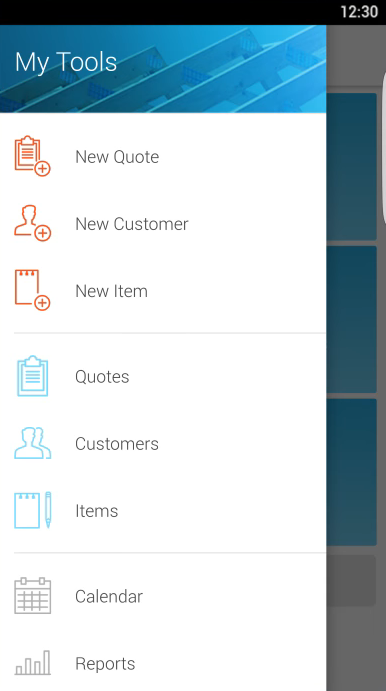
Features of Construction Apps
- Estimating: Quickly and easily create estimates in the field via customizable forms you can preview or email. Include photos taken directly from your mobile device. Build cost models for executing job-based work. Includes functionalities such as takeoff which allows for dimensional information to be extracted from blueprints and converted into a list of required materials. Easily syncs with purchase orders required to complete a job.
- Bid Management: Handles RFIs and submittals between your team members and any change orders required.
- Scheduling: View and manage the schedules of your staff (labor) and see what projects they are assigned to (resource management). Will help determine a more accurate completion date by automating calculations that are based on schedule constraints of the labor and equipment.
- Project Management: Track the status of projects from the field. Create task lists and assign workers to appropriate job roles. Communicate with other employees and clients. Manage estimates, bidding, proposals, and expense tracking at the project level. Attach photos to confirm completed work or note an issue.
- Document Management: View documents from anywhere and anytime. Provides automatic revision control of needed documents for your construction site. Set permission levels for various documents. Monitor the view history to ensure documents have been viewed in a timely fashion.
- Blueprints: Survey your job site with the help of 3D models. Get measurements such as distance, area, volume, etc.
- Punch lists: Create a document near the end of a construction project that lists all work not conforming to contract specifications. Ensure work is allocated to the appropriate subcontractors and completed on-time.
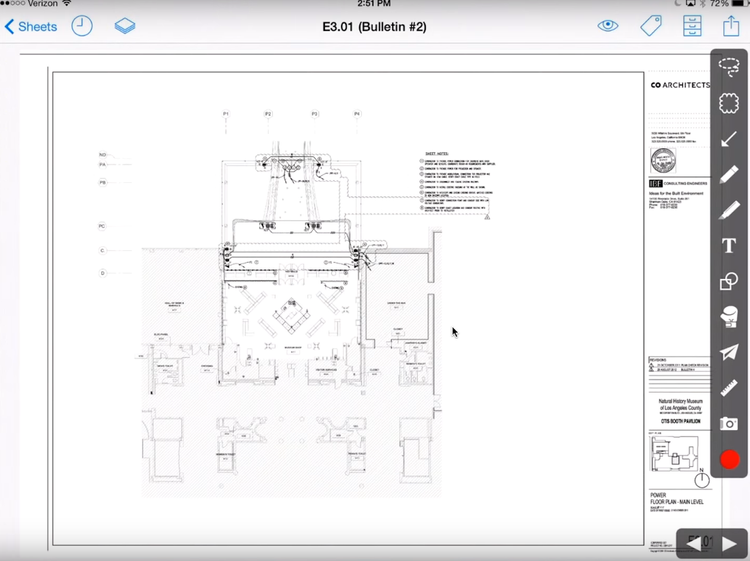
Benefits of Construction Apps
To make sure that you are choosing the best construction app for your business, you’ll want to evaluate what your priorities are as a business, and what job processes you are trying to improve. Some of the top benefits of construction apps include:
Create An Efficient Workforce and Boost Productivity
Mobile construction software will help construction managers improve the efficiency of their operations and increase the transparency from beginning to end. This is because construction mobile applications will replace manual methods of writing information on paper, which in and of itself is a time-consuming process.
When contractors in the field have a powerful mobile app at their fingertips, data can be entered immediately. This eliminates the need for workers to haul back to an office to input key data. The time saved transporting back and forth from the job site to an office can be decreased significantly, leaving more time for workers to remain on-site completing the job.
Mobile construction apps can also save the time it takes to do other tasks. For example, before digital photos, you may have to wait for the film to be developed before it could be added to any official project file. Even when a digital camera came around, you still had to go back to the office to upload photos. With an “always connected” approach and cloud-storing capabilities, any photos taken on the job site can immediately be sent to the necessary people.
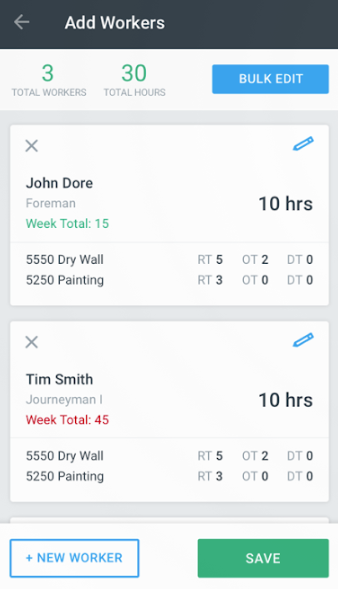
Maintain Safety Compliance
Unlike a traditional office environment, construction teams have a number of hazards workers deal with on a day to day basis. Mobile applications for the construction industry can help mitigate some of these hazards through improved operations, which will help lead to a reduced rate of injury.
The Occupational Safety and Health Administration (OSHA) says 21.1% of fatalities in the private industry are in the construction field. They reference construction’s “fatal four”, which refers to falls, being struck by an object, electrocution, and being caught-in/between. Fall protection was the number 1 most cited OSHA standard violated in 2018. This means that the injury rate for the construction industry is much higher compared to other industries.
Mobile platforms can track which contractors have completed training sessions, which keeps your business up to date on regulatory compliance. It can also track the timeliness of reports that pertain to safety concerns, any injuries, and how quickly issues were resolved.
On-site inspections can also be time-stamped to prove when an inspection took place, and if their GPS location sync with that of the job site being inspected. Inspections will also not be allowed to be submitted under the required fields have been completed, adding another layer of validation a manual method can not provide.
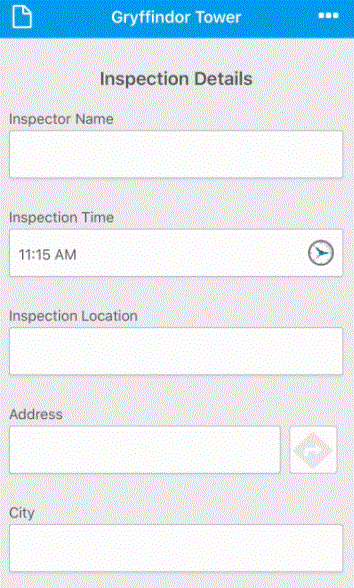
Encourage Communication Among All Types of Workers
The three main employees involved with a construction job include the project managers, the owners, and the supervisors. All three employees will be involved in a project in their own way, and may not have the type of pulse on a project that the other will. For example, an owner may care more about completing a project under budget, while a project manager cares more about completing the project on-time with no worker issues.
A construction management app will give all three types of employees better insight into the project, and see what type of communication is occurring between all levels. A project manager may be able to update the status of a project in the field. This information can immediately update the supervisor overseeing all project managers. Finally, the owners can periodically check-in to ensure projects are coming along at the pace and budget expected.
This level of relationship building will ensure that your construction business has a level of transparency every step of the way. All stakeholders will feel like they are involved and their voices are heard when they can easily participate in the process.
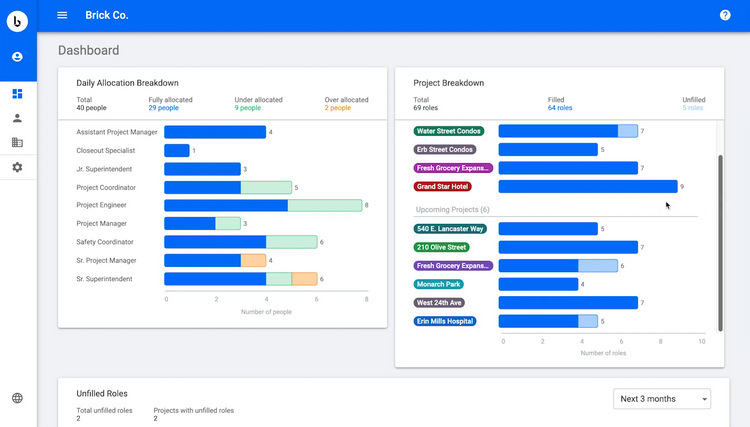
Construction Apps Pricing Guide
The cost of construction apps will vary on the functionality the mobile app provides, as well as if it is offered as an extension of an existing construction ERP software. Most construction apps will be priced on a month to month subscription-based pricing model. This is because most solutions will require some sort of data or internet connection to communicate with other team members in the field or with personnel back at the office.
A simple construction mobile app providing one piece of functionality will start at $8/month. For example, some construction app’s will be used solely for document control, or solely for taking pictures and assigning them to specific projects. There are many free options that exist, but they may offer limited functionality and only be suited for freelancers.
If you own a web-based or desktop construction project management software, they may offer a mobile app version. These are usually slimmed-down versions of their main solution and are only meant to provide ease of access to needed data in the field. Most of these options will still require a heavy amount of input back at the office. These web-based options start at $39/month.
Technology Trends in Construction Apps
Our construction technology trends survey found that 58% of SMB construction professionals say their business at least “sometimes” relies on mobile or tablet-based applications. Over half of respondents said the most common use cases of mobile tech in construction include:
- Daily field reports
- Customer/job information
- Drawings, photos, documents
- Job costing and project reports
